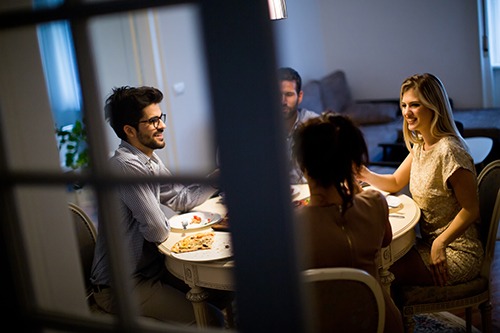
Socialising in France vs. the UK: How to Navigate Friendship and Social Circles
Having lived in England for thirty years before returning to France, I experienced first-hand just how different the social norms and expectations are in both countries. It wasn’t an easy transition, even for someone like me who speaks both languages and understands both cultures. Re-adjusting to French social customs took time, and it really highlighted how distinct the dynamics of friendship are between France and the UK.
Now, with years of experience in both countries, I can fully understand why these differences can be challenging for British expats. What may seem casual or normal in the UK might come across as formal or even unusual in France—and vice versa. However, with a little understanding and some helpful tips, navigating the social circles in your new home doesn’t have to be difficult. Whether you’re settling into a quiet French village or a bustling city, these insights will help you adapt and feel more connected to the people around you.
Friendship Takes Time in France
In the UK, friendships often form quickly—whether it’s bonding over a shared interest at the pub or chatting in the queue at the supermarket. In France, however, friendships tend to develop more slowly. French people can be more reserved at first and may not open up as quickly as Brits.
Tip: Don’t be discouraged if making friends seems to take longer in France. Building trust is key, so it’s important to invest time in getting to know people. Repeated interactions—whether at a local café, market, or social club—will help form stronger connections over time.
The Art of Conversation
Both the British and the French enjoy conversation, but there are notable differences in style. Brits often engage in small talk, starting with topics like the weather, sports, or current events. In France, however, conversations tend to be more in-depth, often focusing on intellectual topics such as politics, philosophy, or culture right from the start.
Tip: When socialising with the French, don’t be afraid to dive into more serious conversations. While small talk can be a good icebreaker, be prepared for conversations to quickly become more substantial. Engaging with these topics shows interest and respect, and it’s a great way to build rapport.
Formality vs. Informality
Socialising in the UK can often be quite informal—using first names, moving quickly to casual settings, and light-hearted banter are common. In France, particularly in the early stages of friendship, social interactions can be more formal. The use of vous (formal ‘you’) instead of tu (informal ‘you’) is important, and addressing people as Monsieur or Madame before first names is expected until you’re invited to be more informal.
Tip: Always begin with more formal language and follow the lead of the person you’re speaking to. If they switch to first names or use tu, you can follow suit. Starting formal and adjusting as the relationship develops is a sign of respect in French culture.
Social Gatherings: Dinner vs. Drinks
In the UK, meeting friends for a drink at the pub is a common way to socialise. In France, however, social gatherings often revolve around meals, especially dinner parties. French dinner parties are typically more structured and intimate than a casual night at the pub, often involving multiple courses and longer conversations around the table.
Tip: If you’re invited to a French dinner party, it’s polite to bring a small gift such as a bottle of wine, flowers, or chocolates. Be prepared for the evening to last longer than a typical British gathering, and don’t rush the meal—enjoying the food and conversation is part of the experience.
How to Join Social Circles
In the UK, it’s quite common to make friends through shared interests like work, hobbies, or sports, and it’s relatively easy to integrate into new social groups. In France, however, social circles can sometimes be more closed, particularly in smaller towns where friendships have often been established over many years. Joining clubs or attending local events can be an excellent way to meet new people and break into these social circles.
Tip: Look for opportunities to join local clubs or groups based on your interests, such as language exchanges, sports clubs, or community associations. The French appreciate expats making an effort to integrate, so attending local events regularly can help you build connections.
Punctuality and Invitations
In the UK, being a few minutes late to a social gathering is usually acceptable. In France, punctuality is valued more highly, particularly when it comes to formal dinners or events. Arriving too early is considered impolite, but turning up late can also be seen as disrespectful.
Tip: Aim to arrive on time or just five to ten minutes late for social gatherings in France. If you’ve been invited to someone’s home, it’s also polite to bring a small gift. Don’t forget to thank your host both in person when you leave and with a follow-up message the next day.
Making the Most of Language Differences
While English is widely spoken in France, particularly in urban areas or expat communities, making an effort to speak French can make a big difference in how you’re received. Even if your French isn’t perfect, locals will appreciate the effort and it can help to break the ice.
Tip: Don’t worry if you mix English and French in conversation—it’s common, especially among expats. The important thing is to show that you’re trying. Making an effort to speak the local language goes a long way in forming new friendships and earning respect.
Wrapping Up
While the social norms in France and the UK have many similarities, there are some key differences that can make the adjustment challenging for British expats. By understanding and adapting to these differences—whether it’s through more formal interactions, longer conversations, or embracing French hospitality—you’ll find it easier to navigate social circles and build lasting friendships in your new home. Over time, you’ll not only integrate into French society but also enjoy the rich cultural exchange that comes with living between two vibrant and distinct cultures.


